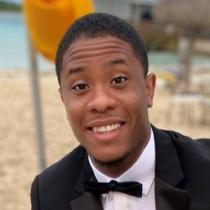
Romaine D Coley
What is your next adventure?
The pandemic has thrown a lot of plans out the window, but not all. I have just passed the Google Cloud Certification so I am hoping to work for Google when the pandemic lets up and things open again. After that, I will pursue a graduate degree that focuses on machine learning.
What about your next adventure are you most looking forward to?
Education has been a long journey - 15 years, really, of studying and working hard, so I am looking forward to applying what I've worked to master. To see something tangible after all of these years will be something exciting. It will also be nice to be able to pay off my student loans. More immediately, my parents flew here from Jamaica and have been stranded here because of the pandemic. So we'll be celebrating, certainly.
Did you have any previous co-op, internship, or research experience in this area?
As a transfer student and as a non-resident -- I'm from Jamaica -- I anticipated from the beginning that there wouldn't be many opportunities for me to do an internship during the two-and-a-half years I've been at Tech. Aerospace engineering as a field is pretty lock-down in terms of citizenship. But I went to the Career Fairs and I went on interviews and had a few callbacks. It was worth it, to see how many companies and options are out there. And I had a lot of classes to take. I came to Tech because I wanted to build planes, and, in my senior year, I was on a team for the Boeing AerosPACE project where we built a UAV from scratch. And it flew. I was the control systems leader on the team, where we remotely worked with students from Purdue and Iowa State.
The area where I'd really like to do research - machine learning - I didn't really know about until my final two semesters, when I took a class with Professor Theodorou.
How did your educational experience at Georgia Tech help you to achieve your goals?
At Tech, I learned not just how to pass a test, but how to really understand the material. Because you'll have to come back to it at some point, and you want to have something to draw on.
This lesson got driven home during one of my first semesters at Tech, when I took System Design and Vibration with Professor Haddad. It's a hard class and one that every aerospace engineer has to take. I had not done modeling for a few years, so I was struggling. In fact, my first test, I absolutely failed. I had always been a straight-A student, and I was determined to not fail. But the only time I could make it to office hours was after I finished work, when most people were gone. I approached Dr. Haddad and told him, straight out; 'If you are willing to work with me, I'll do all of the work it takes to pass this class, to really understand the material.'
He said he was willing. And he was. He'd meet with me for an hour or more after everyone was gone, and I'd go study on my own for hours, filling up notebooks. The next test, I didn't just pass, I broke the curve.
What Dr. Haddad showed me was what it takes to succeed at being an aerospace engineer. It's not just a lot of work. It's a lot of effort. And he was willing to put that effort toward me.
What advice would you give to an underclassman who would like to follow the same path?
Well, most students start out trying to register for classes that don't meet at 8 a.m., and that's not the way to go. I took a lot of the harder AE classes so I could get them out of the way, leaving the AE options classes for the end. I wish I'd paid more attention to those options classes earlier on. They are classes that can introduce you to a subject that could change your direction. When I came to Tech, I had expected that I would master CFD and machine learning, but I had no idea that I'd find them both so interesting. It was by taking a machine learning class during my final semester that I found something that really fit me. It's what I want to continue learning.